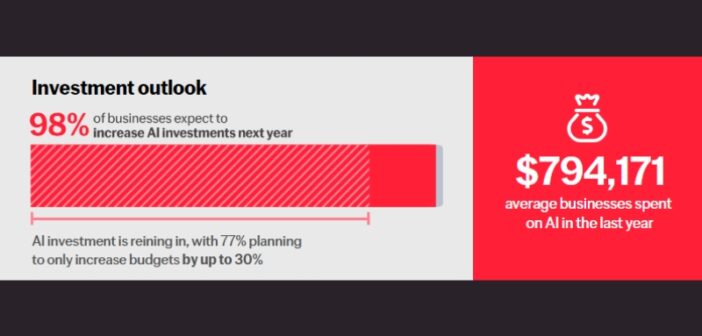ABBYY’s new State of Intelligent Automation: GenAI Confessions 2025 report highlights business leaders’ real-world experiences with generative AI adoption. While 89% said GenAI delivered positive outcomes across their organizations, they also acknowledged challenges and risks when the technology isn’t paired with complementary tools.
The State of Intelligent Automation survey by Opinium Research, commissioned by ABBYY, revealed over a quarter (27%) of US business leaders say training GenAI models was harder than expected. The same number said it was difficult to integrate into their business processes, while 24% said staff misused the tools (the highest globally). In addition, 23% said it was too expensive, 22% did not have proper governance, and a fifth (20%) had problems with hallucinations – when incorrect information is provided.
Many US business leaders said they were able to address the challenges by introducing other technologies, with 40% using AI agents, over a third (36%) turning to process intelligence, 31% using Document AI, and 23% introducing retrieval augmented generation (RAG). Surprisingly in the US, 33% leaders were counterintuitive by asking staff to manually check and correct information – the highest globally.
Adding these technologies and changes resulted in 98% of US businesses ultimately being happy with their GenAI results – seeing better consistency of outputs (58%), better integration into existing workflows (50%), more accurate and reliable results (48%), greater cost efficiency and savings (44%) and increased user trust (42%).
“Businesses are spending money on GenAI tools that promise more than they can provide. In some cases, they don’t even need it,” said Maxime Vermeir, Senior Director of AI Strategy at ABBYY. “Before moving forward with leveraging GenAI tools or agentic AI, companies need to first evaluate their current processes and create a visibility map of their workflow with data analytics tools such as process intelligence.”
Vermeir continued, “When training models prove more difficult than expected, pre-trained, purpose-built AI turns out to be the right solution. We’ve helped customers like a global fast-food chain improve the extraction of data from thousands of lease agreements by 82% by using document AI to improve GenAI outputs.”
The survey showed over a fifth of respondents are experiencing “Shadow AI”, with 22% of US business leaders saying that GenAI is only being used in the company because employees bring it for personal productivity, rather than as part of management-driven initiatives. This means shadow AI is higher in the US than other countries such as the UK (12%) France (19%), Germany (21%) and Australia (17%), although in Singapore 26% of employees admitted to Bring Your Own Software (BYOS).
The research also looked at the reasons behind introducing GenAI, with four in ten (43%) of US business leaders admitting that a driving factor for investment was that employees were already using it on a BYOS basis. This was higher than other regions such as the UK (39%) and France (32%)
More than half (53%) say staff use it to “make them look smarter and more professional”, while 55% say it helps reduce workload and supports creativity. Generally, staff are optimistic about GenAI, with 91% of leaders saying they enjoy positive results. However, in the USA, the biggest bug bear with GenAI is that it can lie. Given a wish list of improvements to GenAI, almost a quarter (23%) of US workers requested GenAI would admit when it didn’t know the answer – this was higher than workers in the UK (15%) and Germany (13%).
Ulf Persson, CEO at ABBYY, comments, “GenAI is creating remarkable opportunities to reimagine how work gets done, which is rightfully generating a great deal of excitement. However, ‘shadow AI’, when individuals use commonly available tools like ChatGPT, Grok, or Perplexity without oversight at work, potentially raises serious data privacy and compliance concerns. The corporate benefits of GenAI’s potential is truly unlocked when leaders drive secure, strategic adoption with risk management as a priority.”
In terms of investment, 42% of respondents said they have spent between $200k and $1m on AI in the last year, with the average spend in the US being $795k (10% spent more than $3m). As for budgets next year, the average increase is expected to be 22%, while 9% of respondents will raise budgets by over 50%.
To review the ABBYY State of Intelligent Automation Survey, visit the website here.
Methodology
Opinium research of 1,200 senior managers or above in companies of 100+ employees in the US, UK, France, Germany, Australia and Singapore. Research undertaken between 20th of June and 8th of July 2025.
Related News:
Exabeam Research: From Human to Hybrid Report
AI Threats Expose Identity Security Gaps, Keeper Survey Finds

